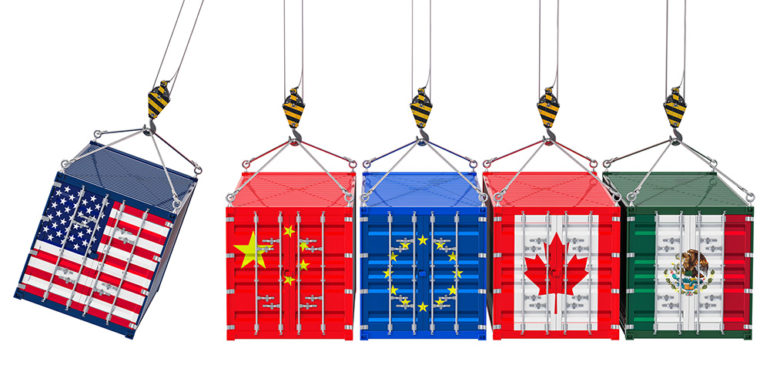The Canadian housing market continues to rebound in the last quarter of 2019, fueled in part by low mortgage rates, especially for fixed-rate mortgages, which are the preferred option for most Canadian mortgage applicants. Global economic uncertainty, resulting largely from U.S. driven trade wars, especially with China, has put downward pressure on interest rates and bond yields this past year. A stagnant bond market makes it easier for mortgage lenders to finance the supply of mortgage loans and offer low fixed rates, but this situation is far from static. In recent months, new signals are emerging from both China and the U.S. that trade relations may be poised to significantly improve. Investors have taken notice, resulting in a rebounding bond market. This is certainly good news for our interdependent global economy, but it could also mean that Canadian mortgage rates, especially fixed rates, may have bottomed out and are about to start rising again.
U.S. Trade Wars have pushed Fixed Mortgage Rates Down
Low fixed mortgage rates have become the norm in Canada in 2019, largely the result of a faltering global economy that is feeling the effects of President Trump’s trade wars, and the resulting downward pressure on interest rates and low yields in bond markets around the world:
Global manufacturing continues to contract as trade falters. The Trump administration’s attempts to overhaul trade agreements are cooling sentiment and raising global uncertainty. Meanwhile, inflation is loitering well below target and driving most central banks to be highly accommodative. The combination of tame inflation and aggressive easing have driven yields lower and powered a rally in global bond prices this year. Close to a quarter of global bonds are trading at negative yields. A serious setback in the US-China trade talks could materially push rates lower from here. – Investment Week
China is not the only country that has been significantly afflicted by the U.S. administration’s aggressive use of tariffs as a mechanism to assert Trump’s campaign mantra: “America First.” The European Union, Mexico and Canada, to name a few, have also been in Trump’s cross hairs, as he continually appeals to his political base by trying to look tough on any nation who might appear to be on the better end of a trade deal with the U.S. However, this posturing has hurt American exports and farmers, cost American jobs to the tune of about 40,000 jobs per month (according to the Federal Reserve Bank of Atlanta) driven up inputs for American industries and directly threatens the purchasing power of American consumers as we move through the critical Christmas retail season.
U.S. Relations with China Appear to be Improving
In early October, President Trump announced that he had reached an “Agreement in Principle” with President Xi Jinping of China, although many of the details still need to be ironed out. This has helped spur a significant recovery in 10-year U.S. Treasury yields, in the following weeks, which are increasing to compete for capital in an exuberant stock market, and buoyed by a potential thaw in U.S./China relations, peaking on an announcement that China and the U.S. have agreed to cancel additional tariffs that had been planned for mid-December:
The 10-year yield is up 50 basis points since bottoming at a three-year low of 1.441% in early September. Half of that climb has occurred since Oct. 1, the start of the fourth quarter… The yield on the benchmark 10-year Treasury note rose to its highest level since August on [November 7th] amid reports that China and the U.S. have agreed to cancel additional tariffs that were imposed during their trade war. – CNBC
Additional signals of cooperation were also announced last month, as China showed overt signs of a crackdown on fentanyl production and drug trafficking to the United States:
Chinese authorities on [November 7th] handed severe sentences to members of a fentanyl production ring in an overt show of commitment toward tackling an issue at the heart of President Trump’s criticisms of China. – Washington Post
Pent Up Trade Demand Could Boost Global Economy
To give some perspective on just how much Trump’s trade war with China has cost the global economy, in her first speech as managing director of the IMF, in October, Kristalina Georgieva compared the projected economic fallout to the size of the Swiss economy:
The new head of the International Monetary Fund warned on [October 8th] that America’s trade war with China could cost the global economy around $700 billion by 2020 — a loss equivalent to the size of Switzerland’s entire economy. – The New York Times
It stands to reason, that if U.S./China trade relations significantly improve, as currently projected, pent up demand that has been suppressed over the last year could result in a global economic uptick. If improved trade relations solidify (Trump is notoriously unpredictable) the bond market rally will likely result in an increase to fixed mortgage rates in Canada.
Canada’s Relationship with China Also Starting to Thaw
By honouring a U.S. request to arrest and initiate extradition proceedings against Huawei CFO, Meng Wanzhou, in December 2018, Canada’s relationship with China chilled significantly. Two Canadians living and working in China were detained and important exports like canola were frozen, much to the dismay of Canadian farmers. The Canadian government has been caught between a rock and a hard place on this important file, firing its former ambassador, attempting to shore up international support and sending a new envoy to China. However, now that relations between China and the U.S. are improving, Canada appears to be receiving some collateral benefit.
Last month, the Canadian government announced that a Chinese ban on Canadian beef and pork exports, implemented in June ostensibly due to falsified export documents, would be lifted:
Prime Minister Justin Trudeau said [Nov. 5th] Canadian beef and pork exports to China will resume, closing the file on just one of the irritants in the Ottawa-Beijing relationship. – CBC
Canada’s relationship with China still has a long way to go. However, given the initial cause of the dispute, as U.S./China relations continue to improve, Canada will also likely receive further diplomatic and trade benefits, which will boost the Canadian economy and put upward pressure on inflation and Canadian interest rates.
Canadian Housing Market Rebounded Significantly in 2019
Another factor weighing on the minds of Canadian mortgage applicants is the state of housing markets across Canada, which are rapidly recovering this fall from new stringent mortgage regulations implemented nearly two years ago, and rising rates through 2018:
Canada’s housing market is back with a roar this fall. Benchmark prices in Toronto jumped 5.2 per cent to $805,500 in September from a year earlier, only about $10,000 below their peak two years ago. While prices in Vancouver continue to fall, sales rebounded 46 per cent, the third month in a row of year-on-year gains. Montreal and Ottawa continue to chug along and even in beleaguered Calgary, the energy capital of Canada, sales rose 8.2 per cent in September from last year. – BNN Bloomberg
With global trade likely to accelerate, pending a new U.S./China trade deal, this trend will probably continue as pent up economic activity in Canada and the U.S. materializes.
Further Government Assistance for New Canadian Home Buyers
Amidst the prospect of rising mortgage rates and increased activity in the Canadian housing market, new entrants to the home market may also get a bit of boost from the newly elected Liberal minority government, if they hold to related election promises, such as increasing the qualifying value of the First-Time Home Buyer Incentive Program:
“We will…increase the qualifying value to nearly $800,000 in the places where houses cost more—like the greater Toronto, Vancouver and Victoria regions,” the party promised. “As market dynamics change in different regions, the program will be adjusted to reflect those realities.” – ratespy.ca
The Liberals also promised to increase the Home Buyer’s Plan withdrawal limit from RRSP savings for first time homebuyers from $25,000 to $35,000. If these promises come to fruition, there will be at least some level of additional fuel for an already rebounding and increasingly competitive housing market in terms of pricing and demand.
Hatch Offers Some of the Lowest Rates Available Under Current Market Conditions
With the prospect of upward pressure on both mortgage rates and home prices in the cards going into 2020, Hatch strives to offer some of the lowest rates, on the most popular mortgage products under current market conditions. We do this by cutting out agents, keeping our overhead low, working with a variety of top notch lenders and streamlining our mortgage applications online. If you’re looking to lock in a great mortgage rate, especially before rates go up, and benefit from the guidance of our award-winning Principal Broker, Dan Martel, with over 30 years of experience, so you also get great terms with your mortgage… Hatch has you covered!



















 2025 Hatch Online Mortgages.
2025 Hatch Online Mortgages.



